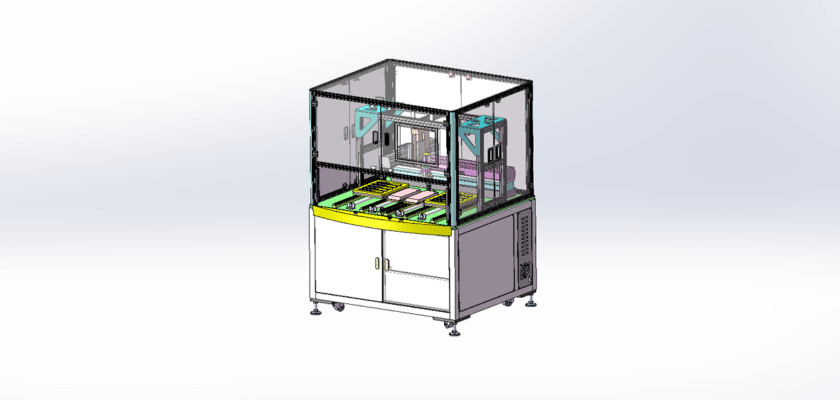Um Desenho de Equipamento de Etiquetagem é uma ilustração técnica que descreve o design e a funcionalidade de uma máquina projetada especificamente para a aplicação de etiquetas em diversos produtos de diversos setores, como alimentos e bebidas, produtos farmacêuticos, cosméticos e bens de consumo. Este desenho serve como referência detalhada para engenheiros, técnicos e operadores envolvidos no uso e manutenção do equipamento.
Principais recursos:
- Layout geral: Uma visão abrangente da estrutura da máquina, mostrando o arranjo dos componentes e suas interações durante o processo de etiquetagem.
- Sistema de alimentação de produtos: Diagramas que ilustram os mecanismos que transportam produtos para a área de etiquetagem, que podem incluir correias transportadoras, rolos ou alimentadores automatizados projetados para manuseio consistente.
- Mecanismo de alimentação de etiquetas: Representação de sistemas que gerenciam rolos ou folhas de etiquetas, incluindo sistemas de desenrolamento, controles de tensão e guias de alinhamento para garantir manuseio e aplicação adequados.
- Cabeça de etiquetagem: Detalhes sobre o mecanismo do aplicador, que pode utilizar rolos, escovas ou sistemas de sopro para aplicação precisa de etiquetas nas superfícies do produto.
- Recursos de ajuste: Informações sobre componentes ajustáveis que permitem que a máquina acomode vários tamanhos e formatos de produtos, garantindo versatilidade em aplicações de etiquetagem.
- Painel de controle: Ilustrações da unidade de controle central que gerencia a operação do equipamento, permitindo que os operadores monitorem processos, ajustem configurações e acessem dados de desempenho em tempo real.
- Interface do usuário: Informações sobre a tela sensível ao toque ou painel de controle que fornecem acesso intuitivo às configurações da máquina, incluindo dimensões da etiqueta, velocidade da aplicação e posicionamento do produto.
- Sistemas de Controle de Qualidade: Diagramas mostrando sensores ou câmeras integrados que monitoram o processo de etiquetagem para garantir a precisão, garantindo que cada etiqueta seja aplicada corretamente e adira adequadamente.
- Sistemas de saída de dados: Informações sobre como os dados de produção, incluindo contagens de etiquetagem e métricas de qualidade, são registrados e comunicados, com displays digitais para feedback imediato.
- Estrutura Mecânica: Detalhes sobre os componentes estruturais que sustentam a máquina, garantindo estabilidade e durabilidade durante a operação.
- Recursos de segurança: Informações sobre mecanismos de segurança, como paradas de emergência, proteções de segurança e sensores para garantir uma operação segura durante todo o processo de etiquetagem.
- Fonte de energia: Informações sobre os requisitos elétricos e sistemas de backup para garantir uma operação confiável.
Este desenho serve como uma referência abrangente para entender o design e a operação de equipamentos de etiquetagem, garantindo altos padrões de eficiência, precisão e eficácia no processo de etiquetagem em diversas aplicações.
